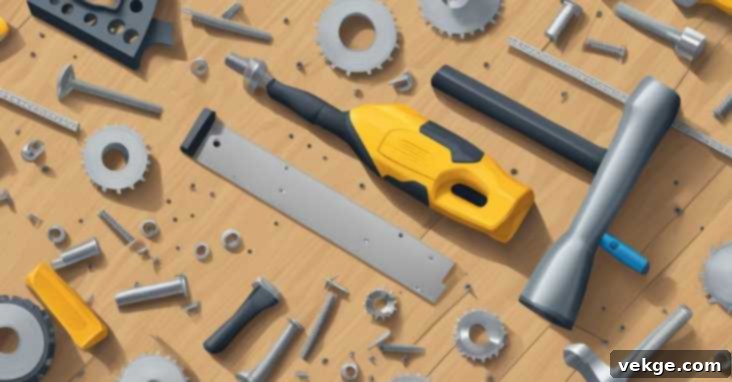Beyond Power: The Ultimate Guide to 21 Essential Hand Tools for Every Modern Builder
In the demanding world of construction, a builder’s toolset is far more than just a collection of objects; it’s a trusted companion that translates intricate designs into robust, tangible structures. While the roar and efficiency of power tools have undeniably revolutionized the industry, the foundational importance of traditional hand tools remains unwavering. These indispensable instruments offer unparalleled precision, nuanced control, and remarkable versatility that no machine can fully replicate.
Hand tools allow for the delicate adjustments, intricate finishes, and the sheer tactile feedback crucial for high-quality craftsmanship. They are the bedrock of any successful building project, empowering professionals and DIY enthusiasts alike to approach tasks with confidence and achieve superior results. This comprehensive guide will delve into the essential hand tools every builder should not only own but master, ensuring you’re well-equipped to tackle any challenge with expertise and precision.
21 Essential Hand Tools Every Builder Needs for Precision and Efficiency
A well-stocked toolkit is a testament to a builder’s readiness and commitment to quality. While the specific demands of each project may vary, there’s a core set of hand tools that form the backbone of any professional’s arsenal. Let’s explore these 21 vital hand tools, each playing a crucial role in bringing architectural visions to life.
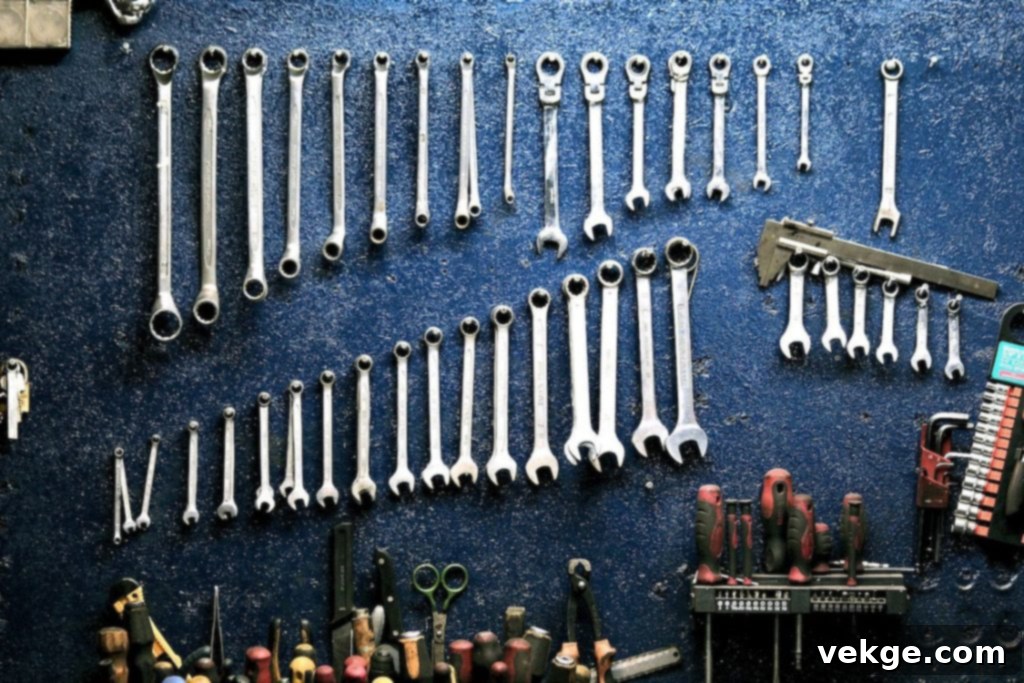
1. Hammer: The Core Striking Tool
The humble hammer is arguably the most recognizable and fundamental hand tool in any builder’s kit. It’s essential for a myriad of tasks, from driving nails with precision to carefully prying apart materials, or even striking chisels and other tools. For optimal performance and longevity, invest in a high-quality, balanced 16-ounce claw hammer, ideally with a fiberglass or steel handle for superior durability, vibration absorption, and comfort during prolonged use. A good hammer makes all the difference in repetitive tasks.
2. Screwdrivers: Versatility for Fasteners
No toolkit is complete without a comprehensive set of screwdrivers. These are crucial for assembly, disassembly, and fastening various components. Ensure your collection includes both Phillips-head and flathead (slotted) styles in multiple sizes. For maximum versatility and to save space, consider a screwdriver set with interchangeable bits, allowing you to tackle almost any screw type and size encountered on a construction site or during home renovation projects.
3. Tape Measure: The Foundation of Accuracy
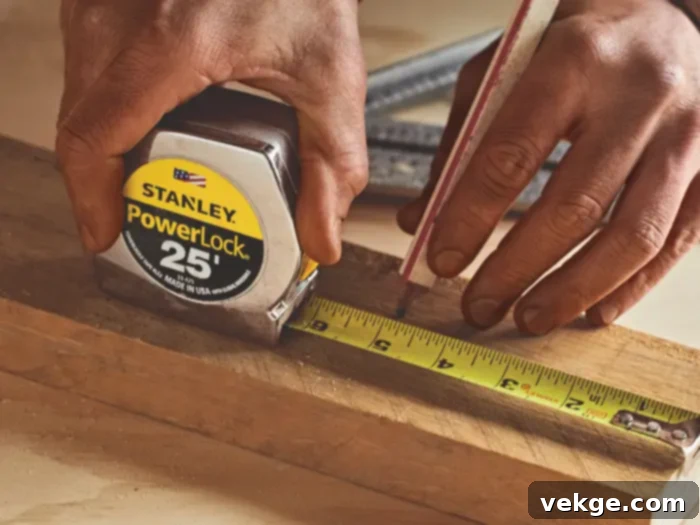
Accurate measurement is the cornerstone of any successful construction project, and a reliable tape measure is your primary tool for this. It ensures precise cuts, perfect layouts, and accurate component placement. Opt for a 25-foot retractable tape measure featuring a robust, impact-resistant case and a dependable locking mechanism. This design allows for effortless, one-handed operation, crucial for efficiency and safety on the job site. Clearly marked, easy-to-read increments are also key.
4. Level: Ensuring True Surfaces
A builder’s level is non-negotiable for achieving perfectly horizontal or vertical surfaces. Whether you’re setting foundations, framing walls, installing cabinets, or laying tiles, a level guarantees that everything is plumb and true, eliminating unsightly slopes and structural inconsistencies. A 2- to 4-foot aluminum level equipped with highly accurate, precision vials is generally ideal for most construction tasks, providing both versatility and reliability.
5. Hand Saw: Manual Cutting Power
Even with the prevalence of electric saws, a sharp, high-quality hand saw remains an indispensable tool for quick, on-the-spot cuts, especially where power access is limited or extreme precision for delicate tasks is required. Invest in a general-purpose panel saw, typically with a 20- to 26-inch blade, designed for efficient cutting through wood, plastic, and even light metals. Its portability and immediate readiness make it invaluable for many construction scenarios.
6. Utility Knife: The Versatile Cutter
A utility knife, often referred to as a box cutter, is a highly versatile cutting tool characterized by its extremely sharp, easily replaceable blade. It’s perfect for a wide array of tasks, including scoring materials, precisely slicing through insulation or drywall, trimming excess flashing, or opening packages. For enhanced safety and convenience, always choose a model with a retractable or folding blade mechanism to prevent accidental cuts when not in use.
7. Pliers: Gripping, Bending, and Cutting Power
A comprehensive set of pliers is vital for any builder. These versatile tools are used for gripping, bending, cutting, and twisting various materials, including wires, nails, and bolts. Your set should include linesman pliers (often called combination pliers) for general electrical work and gripping, slip-joint pliers for adjustable grip, and tongue-and-groove pliers (channel locks) for strong, adjustable gripping on pipes and irregular shapes. Each type serves a specific, crucial function.
8. Wrenches: Fastening and Loosening Expertise
For tightening and loosening nuts and bolts, a good set of wrenches is absolutely invaluable. Your collection should encompass both adjustable wrenches for general-purpose use and a socket wrench set with both metric and standard (SAE) sizes to cover a wide range of fasteners. Consider adding a ratcheting wrench for quicker and more efficient work, significantly reducing the time and effort required for repetitive fastening tasks.
9. Chisels: Shaping and Carving Materials
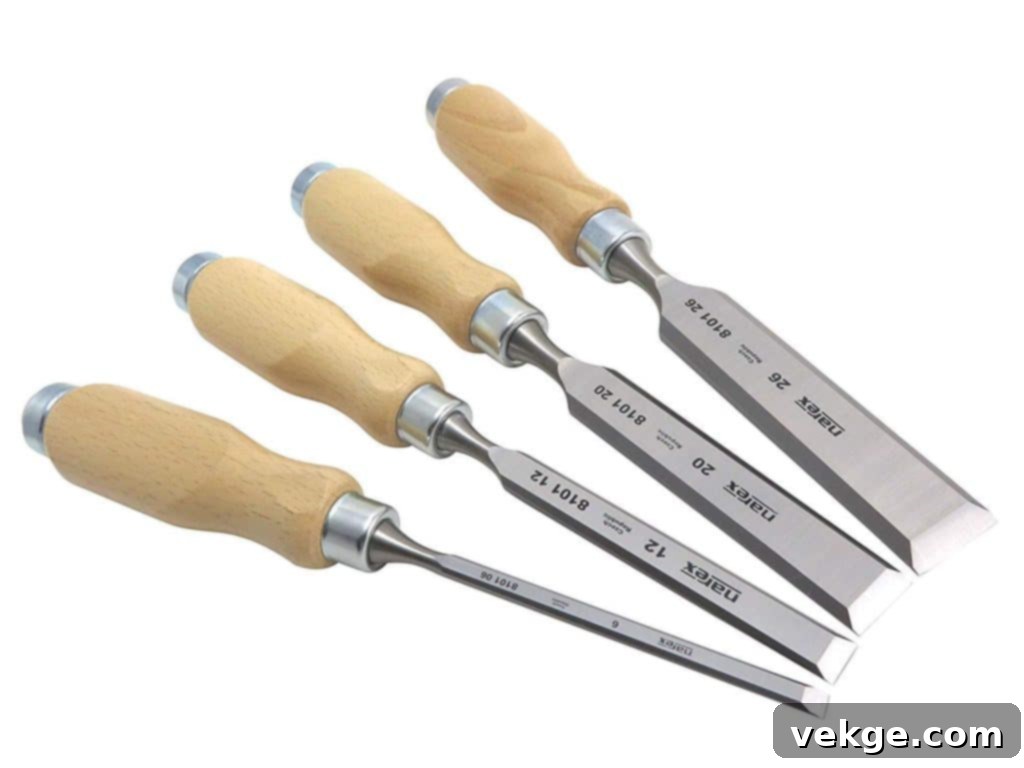
Hand chisels are indispensable for detailed woodworking and shaping tasks. They are crucial for carving out mortises, cleaning up joints, cutting rebates, and shaping hard materials like wood and stone with precision. Invest in a set of high-carbon steel chisels in various widths, ensuring they hold a sharp edge. Always pair your chisels with a reliable mallet (not a metal hammer) to drive them, which protects the chisel handle and provides controlled force.
10. Carpenter’s Square: Accurate Layouts and Angles
A carpenter’s square, also known as a framing square or rafter square, is an incredibly versatile measuring and marking tool. It’s essential for laying out complex roof rafters, ensuring perfect 90-degree angles, marking precise cuts, and checking the squareness of structures. Look for a durable 12- or 16-inch model made of steel or aluminum, featuring clear, precise markings for both standard and metric measurements. It’s a fundamental tool for accurate framing and joinery.
11. Wire Strippers: Safe Electrical Work
For any electrical work, a dedicated wire stripper tool is absolutely essential. It allows for quick, clean, and safe removal of insulation from electrical wires without damaging the conductors beneath. Choose a model with adjustable jaws or multiple gauge settings to accommodate various wire thicknesses. Proper wire stripping is critical for secure electrical connections and preventing hazards.
12. Wood Files and Rasps: Smoothing and Shaping
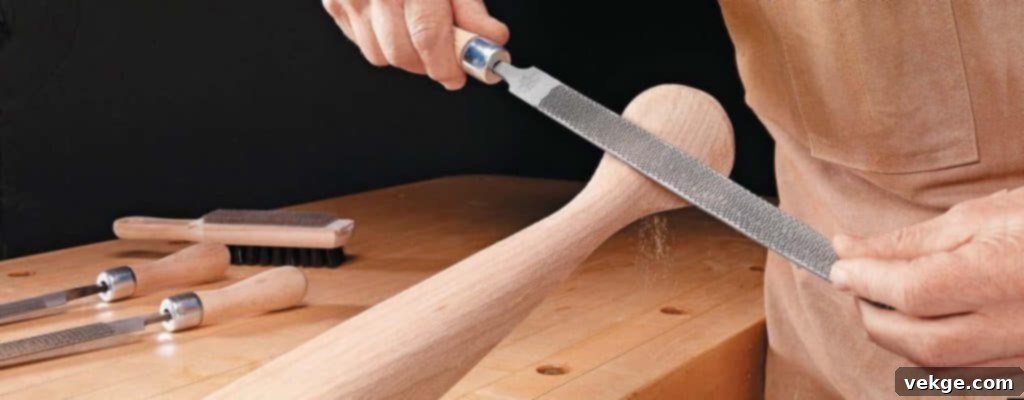
Wood files and rasps are crucial for shaping, smoothing, and refining rough surfaces, preparing them for finishing work or for achieving a perfect fit. Rasps are coarser and remove material quickly, while files offer finer control for smoothing. Select a set that includes various grits, shapes (flat, round, half-round), and sizes to effectively tackle diverse shaping and finishing requirements on any woodworking project.
13. Hand Clamps: Secure Holding Power
Hand clamps are indispensable for securely holding materials in place during assembly, gluing, or cutting tasks. They provide temporary but firm support, allowing adhesives to set or ensuring pieces remain stable while you work. Ensure you have a variety of sizes and styles, including C-clamps, bar clamps, and quick-grip clamps, to accommodate different project scales and material dimensions. A good selection of clamps significantly improves work quality and safety.
14. Retractable Combination Square: Multi-Functional Marking
A retractable combination square is a remarkably versatile hand tool that intelligently combines a ruler, a square, and often a level into one compact unit. This multi-functional design makes it ideal for a wide range of measuring, marking, and layout tasks in construction. Choose a model with a robust, durable body and easily adjustable functionality to ensure long-term accuracy and utility on various projects.
15. Marking Gauge: Precision Scribing
For builders and woodworkers who demand absolute precision, a marking gauge is an essential tool. It allows you to scribe precise, consistent, and parallel lines along an edge, ensuring accurate and repeatable cuts for joinery, dadoes, or mortises. Look for a model constructed with a robust body and high-quality components, such as a sharp pin or wheel and a fine adjustment mechanism, to guarantee long-lasting accuracy and ease of use.
16. Bevel Gauge: Transferring Angles Accurately
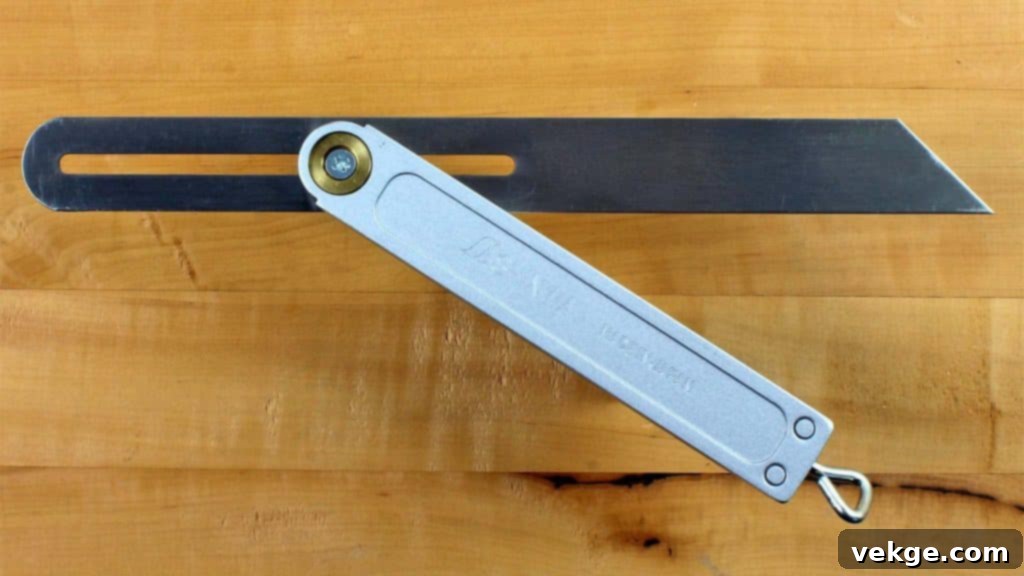
A bevel gauge, also known as a sliding T-bevel, is an essential marking tool for precisely transferring and setting angles. This is crucial for tasks like creating perfectly angled miter cuts, intricate dovetail joints, or matching existing angles on renovation projects. Invest in a high-quality bevel gauge made with durable materials and a secure locking mechanism to ensure accurate angle measurements and reliable performance for all your angled construction tasks.
17. Handsaw Set (Saw Set Tool): Maintaining Blade Performance
Often overlooked, a handsaw set (the tool, not a collection of saws) is essential for maintaining the optimal performance and longevity of your hand saws. This specialized tool allows you to accurately file and ‘set’ the teeth on your handsaws, ensuring they cut efficiently and freely without binding. Including a quality saw set in your hand tool collection demonstrates a commitment to tool maintenance and ensures your saws are always in top cutting condition, extending their lifespan and effectiveness.
18. Marking Knife: Ultra-Precise Lines
A marking knife, distinct from a utility knife, is designed to create extremely clean, fine, and precise lines on materials, particularly wood. Its sharp, often pointed blade scores the material surface, allowing builders to mark cuts and measurements with unparalleled accuracy, especially for joinery where even a hair’s breadth matters. Choose a model with a comfortable handle and a robust, sharp blade for superior marking capability. Like a utility knife, a retractable or folding design offers safety and convenience.
19. Mallet: Gentle Force, Big Impact

A mallet is crucial for striking chisels, tapping components into place, driving wedges, or performing other tasks that require gentle but firm blows without damaging the material or tool being struck. Unlike a metal hammer, mallets typically have heads made of wood, rubber, or composite materials, which absorb vibrations and distribute force more evenly. Choose a reliable mallet designed to protect your valuable tools and workpieces during use.
20. Digital Protractor: High-Precision Angle Measurement
For modern builders, a digital protractor is a high-precision measuring tool invaluable for accurately determining and setting angles. It’s especially useful for construction tasks involving intricate cuts, complex roofing geometries, precise flooring layouts, or when replicating angles from existing structures. Investing in a durable and highly accurate digital model significantly enhances your hand tool collection, ensuring unparalleled precision in angle-critical applications.
21. Steel Scribe: Marking Tough Surfaces
A steel scribe, with its sharp and exceptionally durable point, is the perfect marking tool for materials that are dark, hard, or difficult to mark with a pencil or marking knife. It creates clear, indelible lines on metal, plastic, or concrete, ensuring precise layouts and measurements even on challenging surfaces. Include a reliable steel scribe in your toolkit for those projects where conventional marking methods fall short, guaranteeing accuracy where it matters most.
How to Choose the Best Hand Tools: A Comprehensive Guide
Selecting the right hand tools can feel overwhelming, particularly for those new to the complexities of construction and carpentry. The market is saturated with options, making it challenging to discern quality from compromise. However, by adhering to a few fundamental guidelines and considerations, you can confidently choose the best tools that not only meet your immediate needs but also serve you reliably for years to come, contributing significantly to successful project outcomes.
Here are 10 critical factors to keep in mind when investing in hand tools:
1. Material and Construction: The Foundation of Durability
The quality of materials and the method of construction directly dictate a tool’s durability and lifespan. Always prioritize tools made from high-grade materials that are engineered to withstand the rigors of frequent and demanding use. For instance, look for tool heads made of hardened steel, handles crafted from robust hardwoods (like hickory) or advanced composite materials, and blades forged from high-carbon steel. Such materials ensure the tool can endure heavy impact, resist corrosion, and maintain its integrity over time, providing lasting value.
2. Functionality: Purpose-Driven Selection
Before purchasing, clearly define the specific tasks you intend to perform. Choose tools that are expertly designed for those particular functions. For example, a specialized marking gauge excels at scribing precise, parallel lines, a task a simple ruler cannot replicate effectively. Similarly, a bevel gauge is indispensable for accurately transferring and setting angles for joinery, whereas a standard square would be insufficient. Matching the tool to its intended purpose ensures efficiency and superior results.
3. Precision: The Key to Professionalism
In construction, precision is paramount. Invest in tools that offer consistently accurate measurements and angle settings. Tools like a digital protractor or a high-quality bevel gauge provide the meticulous accuracy required for intricate cuts, complex joinery, and angle-critical tasks where even slight discrepancies can compromise the entire project. Precision tools minimize errors, reduce material waste, and elevate the overall quality of your work.
4. Ergonomics: Comfort and Control
Ergonomics refers to how a tool fits the human body. Choose hand tools that feel comfortable and balanced in your hand, providing a secure, non-slip grip. Well-designed ergonomic features reduce user fatigue during long working hours, minimize the risk of accidents (such as slips or strains), and allow for greater control over the tool. A comfortable grip also translates into more precise and efficient work, making it a crucial factor for productivity and safety.
5. Brand Reputation: A Mark of Quality
Opt for tools from reputable brands that have a proven track record for quality, durability, and innovation within the industry. While such tools might come with a slightly higher initial price tag, their superior performance, longer lifespan, and often better warranty coverage will ultimately save you money in the long run by reducing the need for frequent replacements and improving your overall workflow. Researching user reviews and professional recommendations can help identify reliable brands.
6. Maintenance: Ease of Care for Longevity
Consider how easy it is to maintain and service your tools. Tools with readily replaceable parts (like utility knife blades or saw blades) are more cost-effective in the long term. Ensure you have access to sharpening services or resources for proper maintenance to keep your tools in prime working condition. Regular maintenance not only extends the life of your tools but also ensures they perform safely and effectively on every job.
7. Price: Balancing Quality and Budget
Establish a realistic budget for your tool purchases and then strive to find tools that offer the best balance between quality and affordability within that range. While it might be tempting to opt for the cheapest option, remember that investing in high-quality tools is often a wise decision. They perform better, last longer, and contribute to higher quality work, ultimately proving more economical than repeatedly replacing inferior tools. Think of tools as an investment in your craft.
8. Storage and Organization: Protecting Your Investment
Think about how you plan to store and organize your tools. Choose tools that come with convenient storage options, or consider purchasing a robust toolbox, tool bag, or custom storage system. Proper storage protects your tools from damage, rust, and loss, keeping them readily accessible and organized. An organized toolkit is an efficient toolkit, saving valuable time searching for the right instrument.
9. Warranty and Support: Peace of Mind
Always check if the tools you’re considering come with a manufacturer’s warranty or reliable customer support. A good warranty provides peace of mind, offering protection against defects or malfunctions and demonstrating the manufacturer’s confidence in their product. Knowing that support is available if you encounter issues can be a significant factor in your purchasing decision, especially for more expensive or specialized tools.
10. User Reviews: Real-World Insights
Before finalizing your purchase, take the time to read reviews from other users, especially those with experience in construction or similar trades. User reviews offer invaluable real-world insights into a tool’s performance, durability, ease of use, and any potential issues or problems that may arise. This collective wisdom can help you make a more informed decision, guiding you toward tools that are genuinely effective and reliable.
Final Words: Building with Confidence, One Tool at a Time
Building is an art and a science, and at its heart lies the skilled use of the right tools. Your meticulously curated collection of hand tools will form a solid, reliable foundation for all your construction projects, empowering you with the precise instruments needed to transform blueprints into breathtaking realities. With these essential tools in your arsenal, you’ll approach every task, from the simplest repair to the most complex structural work, with unwavering confidence and professional mastery.
When you’re ready to explore and acquire top-quality construction materials and tools, including many of the essential hand tools discussed here, look no further than FEPY. As the UAE’s leading e-commerce store for building supplies, FEPY is where expert craftsmanship meets cutting-edge innovation. They offer an extensive range of construction materials and tools, all at the most competitive and cost-effective prices, ensuring that you have everything you need to elevate your building experience and achieve exceptional results.
